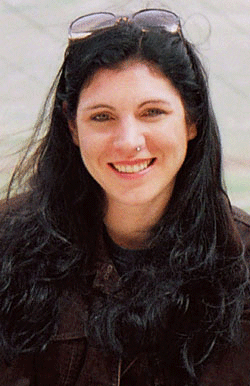
Brigid Maher, Director of “Veiled Voices”
Veiled Voices is a one-hour documentary that investigates the grassroots movement of Muslim women in the Middle East who act as religious leaders. It introduces the viewer to a world rarely seen by outsiders: the world of devout Arab Muslim women leading other women in prayers and lessons. Veiled Voices concentrates primarily on Ghina Hammoud, a divorced mother separated from her children, who has a television program and a charitable foundation in Lebanon, and Huda al-Habash, who has a loving and supportive husband and children, and runs lessons and programs in a mosque in Syria. Veiled Voices also travels to Egypt, where women struggle for public recognition in roles of authority over men; this is contrasted with Syria, where some male religious authorities, such as the Grand Mufti, are encouraging of women in leadership roles. The film shows women empowered, while exploring the struggles they face on both a personal and a public level.
THE STORY
The documentary opens by showing shots of women teaching and preaching in mosques, thereby introducing American audiences into the world of women religious leaders in the Middle East; it then moves to individual portraits, exploring how they are empowered, or disenfranchised, in public and private life. Huda al-Habash teaches lessons to women in the al-Zahra mosque in Damascus, and believes that through education, her followers will gain the necessary pride and confidence to empower themselves in their work and home environments. At home, Huda has a loving, supportive husband, and she has aspirations for her daughter to study in the U.S. The empowerment felt by Huda is reflected in the stance of important Syrian public officials, such as Grand Mufti Ahmad Hassoun, who describes in his interview how he wishes to initiate a program of women as official muftiyas (people qualified to issue a legal judgment, or fatwa) in Syria.
Yet not all of the women that we followed in the documentary are supported at home, and not all male religious leaders are as supportive of women’s public aspirations as the Syria’s Grand Mufti. Ghina Hammoud was the first veiled woman to appear on Lebanese television over fifteen years ago; she runs her own Islamic Center in central Beirut and provides social services and charity to both Shi’a and Sunni women. Despite the tensions just outside the center’s door, her message unites the women inside. Yet she has faced a difficult personal journey as a divorced woman who does not have custody of her children. Her own heartache leads her to counsel other women against divorcing their husbands.
In Egypt, Su’ad Saleh, who teaches at al-Azhar University and has a weekly television show, is regarded as the most influential woman religious leader in Egypt. She gives on-air fatwas (religious judgments), and has recently challenged the al-Azhar hierarchy as she wishes to become a recognized muftiya. Yet Ahmad Tantawi, the Grand Sheikh of al-Azhar, has no plans for a formal program for women as muftiyas, and she has remained a de facto muftiya without formal recognition from the country’s male religious leaders.The film concludes by looking at the next generation of Arab Muslim women leaders through focusing on Huda’s daughter, Enas, who is hoping to study in the United States and Ghina’s daughter, Haneen, who wishes to take over her mother’s Islamic Center when she retires.
VEILED VOICES TRAILER (2007) Producer and Director. Filmed in Lebanon, Syria, and Egypt. The trailer introduces the viewer to a world rarely seen by outsiders: the world of sheikhas (women religious leaders) in the Middle East and beyond by providing a glimpse into the thoughts of Sheikha Ghina Hammoud who runs her own Islamic Center in Beirut, Lebanon. The trailer also includes interviews from Professor Saba Mahmood discussing the movement of women religious leaders and Professor Stephen Humphreys’ observations on the historical role of sheikhas.